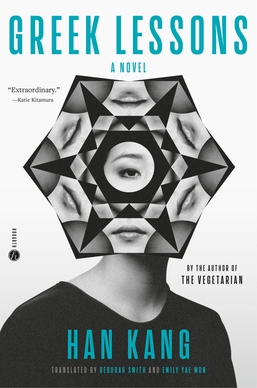Top Qs
Timeline
Chat
Perspective
Greek Lessons
2011 novel by Han Kang From Wikipedia, the free encyclopedia
Remove ads
Greek Lessons (Korean: 희랍어 시간, romanized: Huilabeo Sigan) is a 2011 novel by South Korean author Han Kang. Published in South Korea on November 10, 2011, the book received an English-language release on April 18, 2023 by Hogarth Press. The novel was translated into English by Deborah Smith and Emily Yae Won.
Remove ads
Plot
A young, recently mute woman begins taking a class in Ancient Greek in an effort to reclaim language in some way. Her teacher, who is slowly going blind, draws closer to her over the course of their classes. As they become more intimately connected, they explore their inner pains and tensions together.
Development
Publication history
Greek Lessons was first published in South Korea on November 10, 2011, by Munhakdongne. The English-language edition, translated by Deborah Smith and Emily Yae Won, was published by Hogarth Press on April 18, 2023.[1]
Reception
Summarize
Perspective
The novel received mostly positive reviews upon its English-language release.[2] Publishers Weekly and Kirkus Reviews both published positive reviews praising the narrative and Han's prose.[3][4] The San Francisco Chronicle described Han as "one of the most unconventional, perceptive, and truly innovative writers publishing today" in a positive review, while The Los Angeles Times praised her for "writing into discomfort."[5][6] Em Strang wrote in The Guardian that translating the book into English was a benefit as it highlighted the book's thematic exploration of language.[7] TIME named the book one of the 100 must-read books of 2023, calling it a "profoundly sad yet hopeful look at the connection that comes with shared language—even when it is not spoken."[8]
Idra Novey, writing for The New York Times Book Review, praised Han's character work and the novel's themes yet noted that Han's "voice seem[ed] less certain" than in her previous work.[9] In contrast, The Times' Alice O'Keefe was more critical, writing that Han's language could be "beautiful and surprising" yet criticizing the novel's dark tone.[10] A review in The Wall Street Journal concurred, arguing that the novel's existential themes were better handled in her previous book The Vegetarian.[11]
References
Wikiwand - on
Seamless Wikipedia browsing. On steroids.
Remove ads

